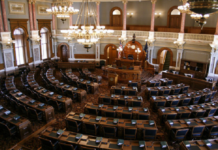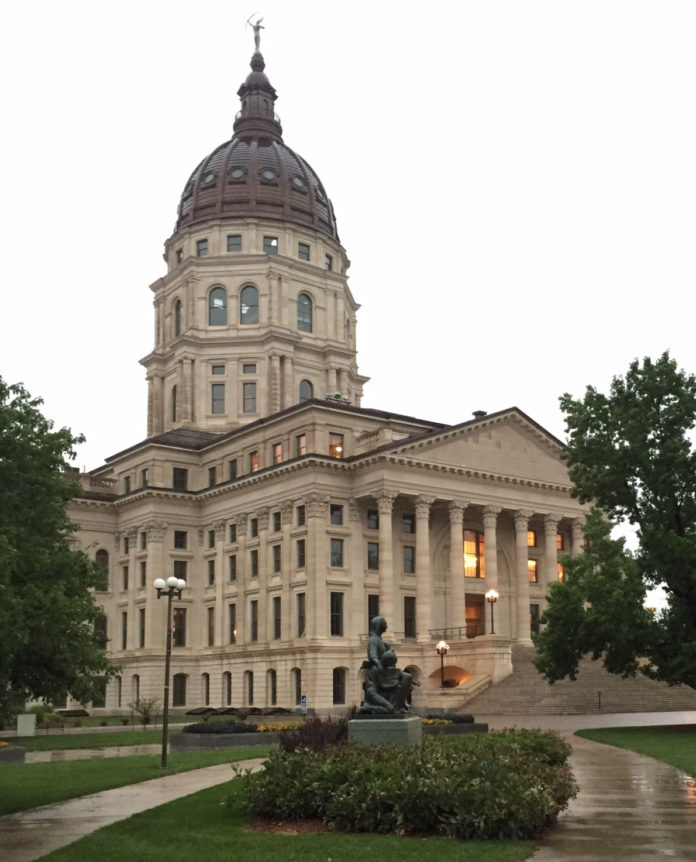A bill prohibiting students whose biological gender is male from competing in interscholastic sports for females advanced out of a committee Tuesday with LGBTQ advocates saying the legislation wrongly singles out transgender children.
“This simply goes back to an attack on trans kids,” said Democratic state Rep. Stephanie Byers, who was elected the state’s first transgender legislator last year.

“Let’s face it, we as adults have a voice,” Byers said.
“But for that 14-, 15-year-old kid, she’s looks at saying, ‘I get to be myself and I get to do it on a girl’s basketball team,’ and now they’re saying, ‘No, you don’t because you’re not enough,'” Byers said. “I think that’s what we’re talking about.”
The bill is among more than a dozen that have bubbled up in state legislatures after President Joe Biden signed an executive order saying it would enforce laws that prohibit discrimination on the basis of gender identity or sexual orientation.
Counting Kansas, similar types of legislation have now been introduced in 17 states this year, including neighboring Oklahoma and nearby Iowa, according to the American Civil Liberties Union.
Last week, Mississippi Gov. Tate Reeves signed a bill requiring the state’s schools to designate teams by sex assigned at birth.
The bill prohibits transgender student athletes from participating in school sports in accordance with their gender identity.
South Dakota’s Legislature passed a similar bill about a week ago and Gov. Kristi Noem said at one point she was excited about signing the legislation.
Republican Sen. Renee Erickson of Wichita introduced the legislation with the goal of ensuring fairness for women in sports so that biological females would compete against other females.
Erickson agreed to amend the bill so that it eliminated a section that provided for how a dispute over a student’s sex could be resolved.
The original bill said a healthcare provider could verify the student’s sex as
part of a physical exam that relied on reproductive anatomy, genetic makeup or testosterone levels.
Erickson said the bill would leave it up to the Kansas State High School Activities Association to resolve disputes over sex, something that opponents say the organization is incapable of doing.
Brittany Jones, advocacy director for the Family Policy Alliance of Kansas, called the committee’s action a “very positive step for girls in Kansas.”
“This is a strong step forward for girls,” Jones said. “It ensures that they have a continued opportunity to compete in sports.”
The bill drew opposition on the committee from Senate Minority Leader Dinah Sykes of Lenexa, Republican Rep. Brenda Dietrich of Topeka and Sen Pat Pettey of Kansas City.
Sykes said gender is not necessarily determined by biological sex.
“Many who oppose transgender rights believe that gender is determined solely by biological sex,” Sykes said.
“Biological sex isn’t as straightforward as they likely think,” she said. “There is no one parameter that makes a person biologically male or female.”
Even as the bill winds it way through the Kansas Legislature, the issue is already playing out in court with a case out of Idaho now pending in the U.S. 9th Circuit Court of Appeals. The case is sheduled for oral arguments on May 3.
Kansas Attorney General Derek Schmidt – a candidate for governor – has joined with 14 other states in a brief asking the appeals court to reverse the ruling that blocked Idaho’s law prohibiting transgender women from competing in women’s sports.
President Donald Trump’s administration had supported Idaho’s law, but the friend-of-the-court brief was withdrawn after Biden’s election.
The lower-court judge found the Idaho law stood “in stark contrast to the policies of elite athletic bodies that regulate sports both nationally and globally…which allow transgender women to participate on female sports teams once certain specific criteria are met.”
The judge also found that the law “established a ‘dispute’ process that allows a currently undefined class of individuals to challenge a student’s sex.”
The attorney general’s office has already indicated that the bill would likely be challenged
on constitutional grounds.
The attorney general has said that – depending on which court system the case was filed – a final judicial decision could take two to four years to reach.













